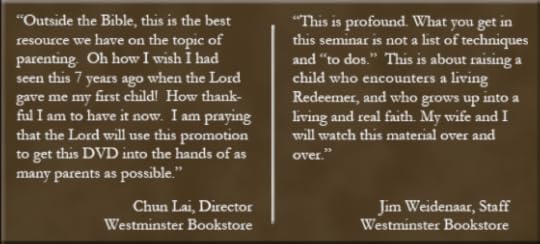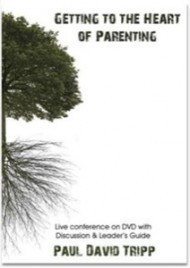Justin Taylor's Blog, page 369
January 12, 2011
Training in Godliness vs. Irreverent, Silly Myths
Martin Luther
Here's an underpainting in oil for T. Lively Fluharty's next book project: illustrations for R.C. Sproul's children's book The Barber Who Wanted to Pray (forthcoming from Crossway in the Fall of 2011):

The Message of the Bible In One Sentence?
That's the question Dane Ortlund recently posed to the following:
Greg Beale
Dan Block
Craig Blomberg
Darrell Bock
Mark Dever
Kevin DeYoung
John Frame
Scott Hafemann
David Helm
Paul House
Gordon Hugenberger
Kent Hughes
Andreas Kostenberger
Phil Long
Sean Lucas
Ray Ortlund
Grant Osborne
George Robertson
Leland Ryken
Tom Schreiner
Mark Seifrid
Jay Sklar
Erik Thoennes
Doug Wilson
Bob Yarbrough
You can read their answers here.
How the Gospel Can Transform a Marriage
Gary and Betsy Ricuchi, Love That Lasts: When Marriage Meets Grace (Crossway, 2006), pp. 22-23:
Because of the gospel, Christians have become new creations (2 Corinthians 5:17). Therefore, in our marriage, our past does not define us, confine us, or determine our future.
Because of the gospel, we are forgiven (Ephesians 1:7). Therefore we can live free of all guilt and condemnation for every sin, and we can trust that God, in his mercy, will be gracious to us.
Because of the gospel, we can forgive, just as Christ forgave us (Ephesians 4:32). Nothing done against us compares to our sin against God. Therefore all offenses, hostility, and bitterness between Christians can be completely forgiven and removed.
Because of the gospel, we are accepted by God (Romans 15:7). Therefore we are not dependent on a spouse for who we are or what we need.
Because of the gospel, sin's ruling power over us is broken (Romans 6:6, 14). Therefore we can truly obey all that God calls us to do in our marriage, regardless of any circumstance or situation.
Because of the gospel, we have access to God through Christ (Hebrews 4:14-16). Therefore we can at any time take any need in our marriage to the One who can do all things.
Because of the gospel, we have hope (Romans 5:1-4). Therefore we can endure any marital difficulty, hardship, or suffering, with the assurance that God is working all to our greatest good (Romans 8:28).
Because of the gospel, Christ dwells in us by his Holy Spirit (Galatians 3:13-14). Therefore we are confident that God is always with us and is always at work in our marriage, even when progress is imperceptible (1 Thessalonians 5:23-24).
Because of the gospel, we have power to fight and overcome remaining sin, which continues to dwell and war within us (Romans 7:19-21, 24-25; Galatians 5:16-17). This indwelling enemy represents the essence of what is called the doctrine of sin.
These are just a few of the ways the gospel can transform a marriage. Sometimes it's not easy to live in the reality of these truths. But it is always possible—and not because of our strength or determination, but because of God's empowering and enabling grace.
How Historical Misintepretations Can Become Standard Interpretations
John Woodbridge's foreword to Paul Helseth's "Right Reason" and the Princeton Mind: An Unorthodox Proposal contains a helpful recounting of how ungenerous readings of history can become the orthodox reading:
Sometimes historians cite as a heuristic stopgap measure their commitment to peer review as a means to protect them from slipping into radical personal subjectivity in historical writing.
Historical articles and books generally undergo a robust review process before they are deemed worthy contributions to the scholarly world.
Expert reviewers for university presses and scholarly journals are charged to offer ostensibly fair-minded assessments of the quality of manuscripts submitted for publication.
Then, after publication, works are further reviewed in scholarly journals. Reviewers often point out weaknesses and strengths of the publication and sometimes not suspect ideological proclivities of the author—biases that might compromise or jade the "truthfulness" of the book's central contentions.
Should well-respected reviewers concur that a particular study is genuinely superlative, their approval might propel the book toward becoming a "standard," authoritative source on the topic it addresses. Other historians who read the positive reviews may conclude that so persuasive and conclusive is the book's coverage and central argument that the need no longer exists to do further research in the field. Did not distinguished reviewers of the volume, the quality control gatekeepers for the historians' guild, put seals of approval on the newly minted "standard" interpretation?
With the passage of time, a consensus in favor of the "standard" interpretation may grow even stronger among historians. Additional studies may appear that seem to confirm its basic premises. The new "standard" interpretation takes on on the allure of a historical "orthodoxy'; that is, a received interpretation that knowledgeable scholars in the field should adopt regarding the topic under consideration. The "orthodoxy" can become so ingrained in the collective consciousness of the historical community that few historians ever contemplate doubting its validity.
In this context, any enterprising scholar who should dare to offer an alternative, "unorthodox proposal," to the effect that the "orthodox" interpretation may need serious revision, undertakes a daunting challenge. To gain a respectable hearing, he or she must offer compelling evidence and arguments in support of the claim. Longstanding "orthodoxies" of historical interpretation are not easily dislodged.
This brings us to the present study by Professor Paul Helseth, an accomplished theologian, philosopher, and historian. In his "Unorthodox Proposal," Professor Helseth, writing in the respected tradition of a gatekeeper reviewer, challenges the validity of one of the most influential "orthodox" interpretations related to the history of American evangelicalism and fundamentalism.
You can find out more about Helseth's very helpful book here.
January 11, 2011
A Conversation with Leland Ryken on "The History of the King James Bible"
The book, due out at the end of January, is The Legacy of the King James Bible: Celebrating 400 Years of the Most Influential English Translation.
The Triumph of the Therapeutic
Philip Rieff's book, The Triumph of the Therapeutic: Uses of Faith After Freud, was published in 1967 and proved to be prophetic:
In the emergent culture, a wider range of people will have "spiritual" concerns and engage in "spiritual" pursuits.
There will be more singing and more listening.
People will continue to genuflect and read the Bible, which has long achieved the status of great literature; but no prophet will denounce the rich attire or stop the dancing.
There will be more theatre, not less, and no Puritan will denounce the stage and draw its curtains.
On the contrary, I expect that modern society will mount psychodramas far more frequently than its ancestors mounted miracle plays, with patient-analysts acting out their inner lives, after which they could extemporize the final act as interpretation. . . .
L. Gregory Jones (in his book, Embodying Forgiveness) comments:
But according to Rieff the effect of this psychodramatic interest in spirituality will not be a return to classical Judaism or Christianity, in which human life is shaped and transformed in relation to sound doctrines and teachings; it will consist, rather, in a consumerist desire to pick and choose one's own spirituality through broad experimentation.
Rieff writes:
The wisdom of the next social order, as I imagine it, would not reside in right doctrine, administered by the right men, who must be found, bur rather in doctrines amounting to permission for each man to live an experimental life.
For more on Rieff, see this helpful review profile by James Poulos.
Where Have All the Active Verbs Gone? The Tucson Murders and the Triumph of the Therapeutic
If you are following the Tucson assassination and the political blame game, be sure to read Kevin DeYoung's insightful post today.
An excerpt:
To be sure, mental illness is real but it does not honor those who endure it to rush a diagnosis and start naming disorders every time an anti-social, nihilistic, solipsistic young man with guns and grudges sins in the worst possible ways. Where have all the active verbs gone?
Unfortunately, pundits shy away from explicitly personal and moral categories in the precisely the moments we need them most (9-11 may be the one exception). Whenever a public tragedy like this occurs everyone on the right and the left struggles to find some cause, and that cause is almost always outside the self—video games, strange novels, mistreatment by friends, a culture of hate, the second amendment, heated political rhetoric. And when an internal cause is suggested it almost always points away from personal responsibility to some element of us that doesn't really belonging to us—like a mental disorder or our own personal demons.
We instinctively resort to passive speech, unable to bear the thought (let alone utter the words) that a wicked person has perpetrated a wicked crime. The human heart is desperately sinful and capable of despicable sins. Of course, no one commends the crime, but few are willing to condemn the criminal either. In such a world we are no longer moral beings with the propensity for great acts of righteousness and great acts of evil. We are instead, at least when we are bad, the mere product of our circumstances, our society, our upbringing, our biochemistry, or our hurts. The triumph of the therapeutic is nearly complete.
One Week Only: 75% New Paul Tripp DVD Set on "Getting to the Heart of Parenting"
This five-hour seminar on parenting by Paul Tripp is on 3 DVDs and normally retails for $59.95.
But for one week only they are selling them at 75% off, or $14.99 (sale ends Tuesday, January 18, at 11:59 PM EST).
[There's a glitch at the site, not showing the discount, but I'm told it will apply will you purchase and checkout.]
You can see from the feedback below how enthusiastic the folks are at Westminster Bookstore about this DVD and why they wanted to run this promo at this price:

Tripp is an effective teacher—insightful into the biblical text and the ways of the heart—and it's hard for me to imagine a better crash course in biblical parenting.
Here's a description:
Parenting is more than using your power to get children to behave in certain ways. Parenting is all about the exposure and change of the child's heart. When the heart of a child changes the behavioral change that is needed will last. This is a great conference for parents raising children from age toddler through teen.
Learn how to be an instrument of heart changing grace in the little moments of life that God will give you with your children. Paul Tripp will begin with giving you a picture for God's design for the family. Because if you don't understand the family; you will never understand parenting. Then, Paul will help you to understand the life transforming and agenda setting things that the Bible says about the heart. Then, he will apply the principles about the family and the heart to the three primary stages of parenting.
In each stage Paul will give you the key issue of focus and practical steps for achieving what is important, at that particular stage of the child's growth and spiritual development. Paul will also help you to identify those places where you are in the way of what God is calling you to do rather than being part of it by helping you to locate your own heart issues.
Here's an outline of the sessions:
What Is the Family? Part 1
What Is the Family? Part 2
Getting to the Heart of Behavior: Part 1
Getting to the Heart of Behavior: Part 2
Ages 0-5: Part 1
Ages 0-5: Part 2
Ages 6-12: Part 1
Ages 6-12: Part 2
Ages 13 and Up: Part 1
Ages 13 and Up: Part 2
You can look online at the discussion guide and leader's guide for free.
And here is a sample video from each section of the DVD set:
January 10, 2011
Happy Birthday, John Piper
Justin Taylor's Blog
- Justin Taylor's profile
- 44 followers














